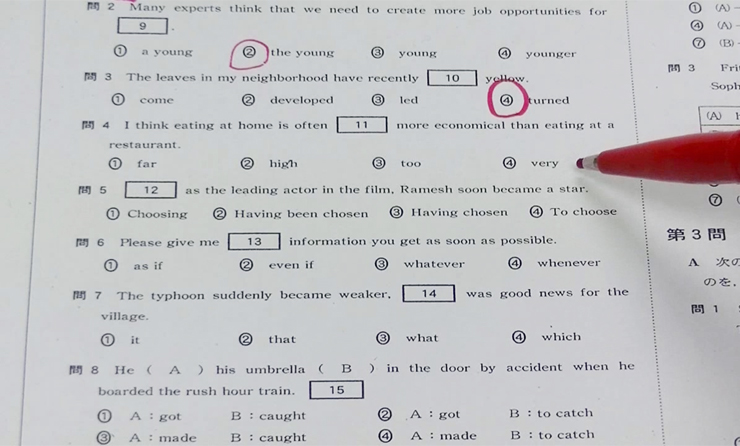過去のセンター試験の第2問で出題された単語・熟語に関する問題です。語彙力のチェックに活用してください。【解答】をクリックすると、解答がポップアップで表示されます。
次の英文の( )に入れるのに最も適当なものを、1~4のうちから一つ選べ
- I've been living ( ) since I entered university, and I've had to learn to cook."
1. by oneself 2. for oneself 3. on my own 4. with only one 【解答】[2000 センター試験(追)]
- "I'm not used to this computer. Do you ( ) to know a person who could tell me how to use it?"
"Oh, Mr. Suzuki uses this machine all the time."
1. happen 2. manage 3. see 4. want 【解答】[2000 センター試験(追)]
- Bill had to leave his family ( ) when he went abroad to work.
1. back 2. behind 3. off 4. over 【解答】[2000 センター試験]
- "May I speak to Mr.Hall, please?"
"I'm sorry, he's not here at the moment. Can I take a ( ) ?"
1. memo 2. message 3. note 4. record 【解答】[2000 センター試験]
- These two plants are different in almost every way. The only feature they have ( ) is their need for dry soil.
1. by chance 2. by nature 3. in common 4. in turn 【解答】[2000 センター試験]
- Sarah is always able to answer the teacher's questions. She is such a ( ) girl.
1. dependent 2. lazy 3. shy 4. smart 【解答】[2000 センター試験]
- "May I use your phone?"
"Sure, ( ). I'm not expecting any calls right now."
1. come about 2. go ahead 3. put in on 4. take it up 【解答】[2000 センター試験]
- It's a ( ) your wife couldn't come. I really wanted to meet her.
1. harm 2. shame 3. sorrow 4. trouble 【解答】[2000 センター試験]
- This phone book isn't ( ). Don't you have a more recent one?
1. from now on 2. in fashion 3. on time 4. up to date 【解答】[2001 センター試験(追)]
- In Japanese cities there are many streets without names. It is very ( ) if you a tourist.
1. careless 2. confusing 3. similar 4. unhappy 【解答】[2001 センター試験(追)]

